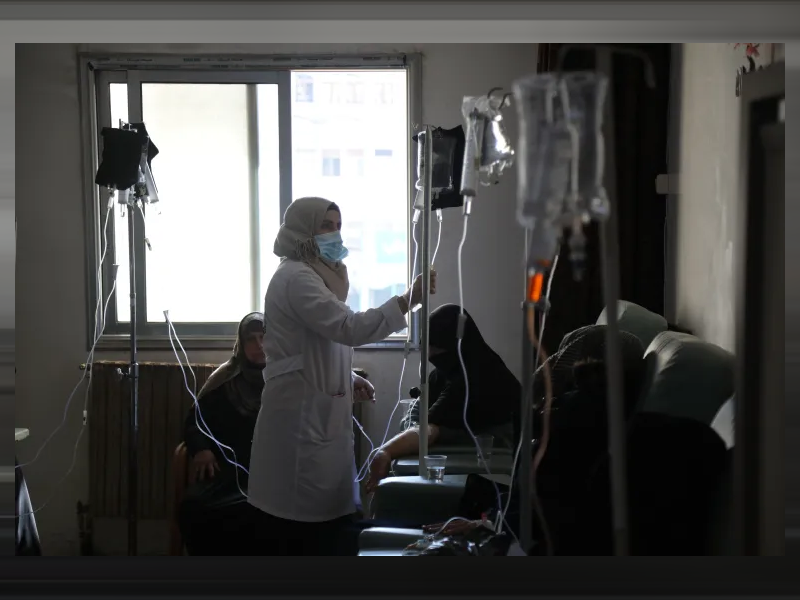Healthcare in Syria is at risk of collapse

- 210
- 0
On April 30, the European Union’s eighth annual conference on “Supporting the future of Syria and the region” in Brussels started with a day of dialogue.
Members of Syrian civil society, representatives of United Nations agencies and international NGOs, and political leaders from the EU and other stakeholder countries came together to debate and strategise about the most pressing humanitarian issues affecting the region. On Monday, May 27, the conference will continue with a ministerial segment aimed at mobilising financial support for people in need in Syria. Ministers attending this important gathering will need to take urgent action to avert the escalation of the healthcare crisis affecting millions of Syrians.
Today, many Syrian communities are facing circumstances more dire than ever before. Health services - already largely dependent on chronically under-funded NGOs in the absence of an organised healthcare system - are now at risk of collapse due to the threat of significant aid cuts. My organisation, Relief International, has been one of the main healthcare providers in Northern Syria since 2011. Yet, we have been struggling to meet the needs of people who have already endured 13 years of conflict. Like other organisations active in the region, we are being forced to focus on basic healthcare and scale down the provision of more advanced and specialist care, which is desperately needed. For Relief International and the seven other organisations we work with in northwest Syria, any cuts could mean the shuttering of tens of hospitals, paediatric intensive care units, mobile clinics and specialised services including cancer screening clinics, dialysis units, blood banks and gender-based violence units.
As a result, more than millions more people could be unable to access the healthcare they need. Even before the cuts for this year were announced, healthcare in Syria was in ruins due to escalating hostilities, the COVID-19 pandemic and last February’s devastating earthquake. There was already a severe lack of medical professionals, medication and equipment. In a report produced with the Syrian American Medical Society last year, we highlighted the plight of cancer patients in northwest Syria: Just three oncologists serve a population of 5.1 million people and radiotherapy treatment is not freely available, leaving many patients helpless. It is not hard to imagine the devastating impact further funding cuts will have on cancer care. Earlier this year, health workers in one hospital reported that there haven’t been any free paediatric beds since November. Mothers who have travelled more than 20 kilometres to seek care for their children are being turned away because facilities are too overrun to admit them. Hundreds of people are on waiting lists to receive prosthetics and assistive devices after being seriously injured by the war and last year’s earthquake. Many families were already struggling to pay for transportation to access free health services. Now, as there are even fewer facilities offering free care, many of these families will have to make do without any care, whatsoever. As aid organisations, we are doing everything we can to help patients.
Relief International and its partners are training existing professionals on under-served conditions, such as malnutrition and mental health, and grouping health facilities together to create networks which increase collaboration, capacity and the quality of care. But these creative solutions - the best we can do with the resources available - are not enough to meet the healthcare needs of Syrian communities in desperate need. Ministers who will come together in Brussels to discuss Syria on Monday must take a series of urgent steps to sustainably resolve the healthcare crisis in the region. First, they must restore funding and scale up resources. Funding must be restored as quickly as possible to keep life-saving health facilities open and dwindling resources must urgently be replenished and scaled up to meet ever-increasing needs on the ground. Second, they must invest in building up Syria’s health workforce. Syria’s healthcare workforce is in dire need of investment, including more training for new and existing health professionals as well as more accredited training programmes. Third, they must allocate funds for more specialist equipment and medication to be made available in the region. Healthcare workers caring for Syrians are struggling with a lack of equipment and medication required to provide secondary and higher-level care. Most healthcare facilities in north Syria do not have the necessary equipment to perform high-level surgeries or the medication necessary to treat conditions like cancer and heart disease. It is crucial to ensure that all Syrians once again have access to more than just basic healthcare in their home country. Fourth, they must ensure all new approaches are coordinated. For meaningful change to be achieved in Syria, all stakeholders should work together. Critically, local authorities, aid groups and the private sector must collaborate closely on new approaches. Resources must be utilised strategically, ensuring that solutions are coordinated and that healthcare does not become even more fragmented. Today there are numerous crises which deserve our attention and support across the world, but the people of Syria must not be forgotten. Monday’s meeting must mark the beginning of meaningful, long-term change. –Courtesy: Al Jazeera

















































